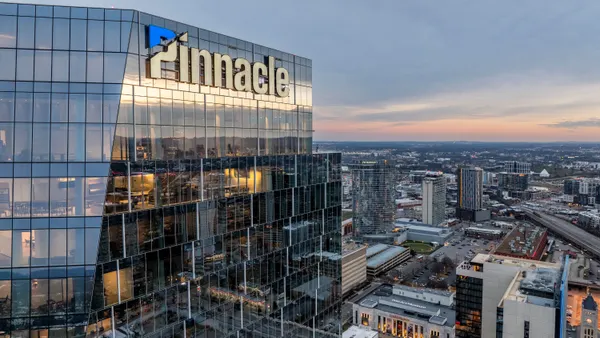Dive Brief:
- New Jersey-based Provident Bank and Lakeland Bank are merging in a roughly $1.3 billion deal to create a “super-community bank” with more than $25 billion in assets and $20 billion in deposits, the banks announced Tuesday.
- The deal, set to close in the second quarter of 2023, would combine two of the area’s substantial commercial real estate lenders and give $10.4 billion-asset Lakeland access to $13.7 billion-asset Provident’s fee-based insurance and wealth management units, while Provident could lean into Lakeland’s asset-based lending and equipment lease financing business, the banks said.
- Provident will be the surviving bank, with locations operating under that brand after the deal closes, and headquarters in Iselin. Provident shareholders will own 58% of the combined entity, and Lakeland shareholders will own 42%, the banks said.
Dive Insight:
The merger would give Provident a 4% share of all bank deposits in New Jersey — second among banks with $100 billion or less in assets, the banks said. It will also fill a midsize-bank gap in the state. At $25 billion in assets, the combined entity would be roughly the size fellow New Jersey lender Investors Bancorp was when Citizens Bank acquired it earlier this year.
“As two of New Jersey’s most respected banks that nearly mirror each other in our shared cultures and missions to support and deliver to our customers, communities and shareholders, we are thrilled that we’re combining our talented teams,” Thomas J. Shara, Lakeland’s CEO, said in a press release Tuesday. “The combination of our companies will allow us to achieve substantially more for our clients, associates, communities, and shareholders than we could alone.”
Shara will serve as executive vice chairman of the combined board once the merger is complete. Chris Martin, the chair of Provident’s board, will continue in his role. The board will comprise nine directors from Provident and seven from Lakeland.
Anthony Labozzetta, Provident’s CEO, will continue as chief executive of the combined entity. Thomas Lyons, Provident’s CFO, will also continue in that role. The combined bank will draw from both Provident and Lakeland to fill remaining executive roles, the banks said.
“The scale and profitability of the combined organization will enable us to invest in the future, better compete for market share, and better serve our customers and communities,” Labozzetta said.
The merger is expected to generate cost savings equal to roughly 35% of Lakeland's expense base and yield an internal rate of return of about 20%, bank executives estimated.
Lakeland shareholders will receive 0.8319 shares of Provident stock for each Lakeland share they own once the merger closes, the banks said.













